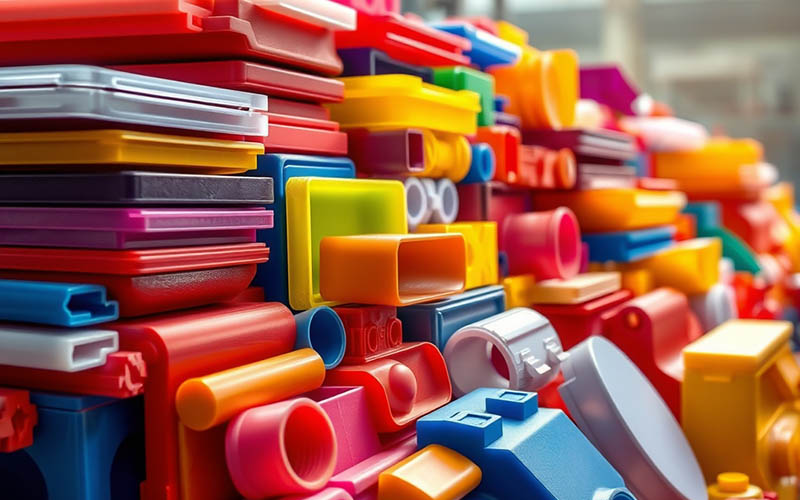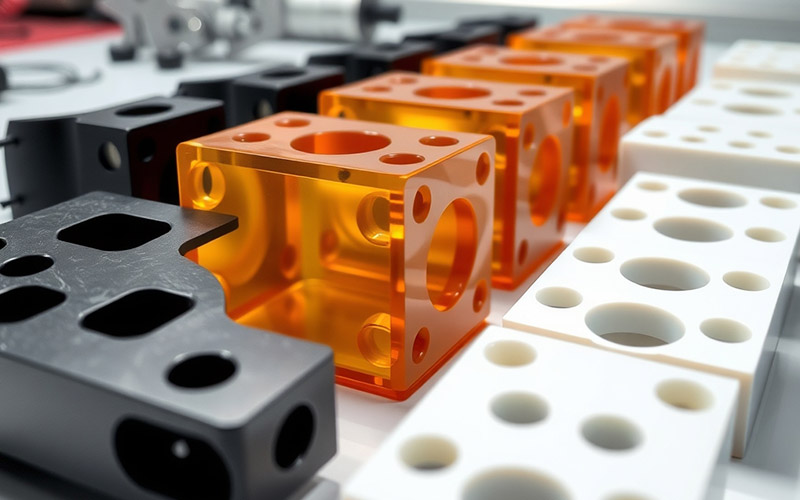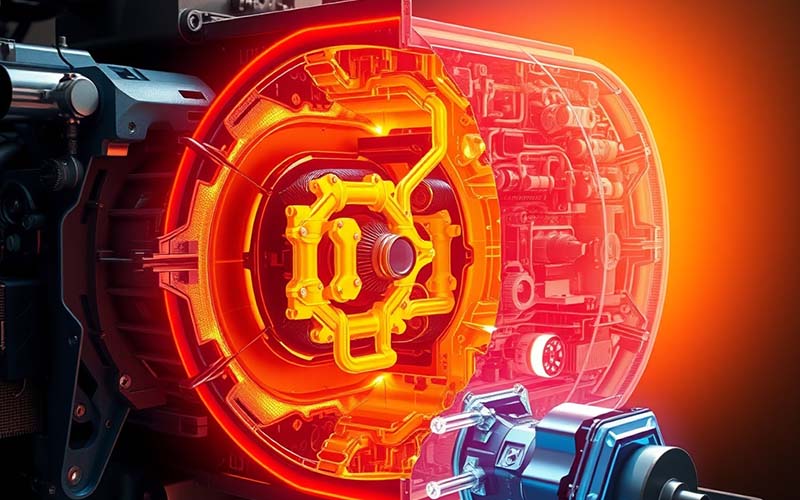Let Istar help you get started on your project with our experience and know-how!
Upload your design files and production requirements and we will get back to you within 30 minutes!

In this article, I will share the things I have learned. We will talk about the best plastic materials that can handle heat. You will find out why they are special. You will also learn how to choose the right one for your needs. This will help you save time and money. It will also help you avoid the trouble of a part that has melted. This is my list of the top 10 heat-resistant plastics.
Plastics are not all alike. Some plastics will get soft if left in a hot car. Other plastics can work inside the engine of a jet. The reason for this difference is how they are made. A heat-resistant plastic is a special kind of polymer. You can imagine a polymer is like a chain. It is made of very small bits, called molecules, that are all joined together. In these special kinds of plastics, the chains are extra strong. They hold together very tightly.
Because of this strong connection, they do not get soft or weak when the temperature goes up. Their solid build gives them great thermal resistance. They can hold their shape. They also keep their mechanical strength even when they are around high temperatures. These high-performance plastics are made to handle tough situations. Other materials would fail in these situations. Being able to withstand heat makes them a great choice for many industrial applications.
To talk about heat resistance, we use numbers. These numbers help us compare different materials. I always check two important numbers. The first one is the glass transition temperature. This number tells you the temperature when a hard polymer begins to get soft, like rubber. The plastic is not melting yet. But it is starting to become less strong.
The second number is the heat deflection temperature. This number shows the temperature when a plastic part will start to bend if you put something heavy on it. For this number, higher is better. Another very important number is the continuous service temperature. This tells you the highest temperature a plastic can be in all the time without getting damaged. Knowing these numbers is very important for choosing the right material for any high-temperature job. Plastics are classified using these heat-related features.

You may know PTFE from its popular brand name, Teflon. I have used PTFE for a lot of different jobs. It is a very useful and common heat-resistant plastic. One of its greatest qualities is its very low friction. This means it is very slippery. Things do not stick to it easily. That is why people use it to make non-stick cooking pans. That low amount of friction also makes it a good choice for parts that need to slide past each other. PTFE is a wonderful type of thermoplastic.
The truly special thing about PTFE, though, is its great ability to handle heat and chemical resistance. It can work at an operating temperature as high as 500°F (260°C). There are almost no chemicals that can damage PTFE. Because of this, it is a perfect choice for seals and gaskets. It is also good for lining pipes that have strong chemicals inside. I rely on PTFE for difficult jobs. It has a high melting point, and you can count on it to work well. For uses that involve high temperature, PTFE is a top choice. We use PTFE because it is a reliable heat-resistant plastic.
When I need a plastic that is very strong and can also take a lot of heat, I often choose PEEK. This material is amazing. PEEK is a high-performance thermoplastic. It has wonderful mechanical properties. It does more than just handle heat. It also stays strong and firm when at a high temperature. This quality makes PEEK a top material in the group of performance plastics.
The full name is polyether ether ketone, but everyone just calls it PEEK. It also has great wear resistance, so it lasts a long time. And it has good chemical resistance. You will see PEEK used in things like medical implants. It is also in parts for airplanes and car engines. It is able to withstand temperatures that are as high as 480°F (250°C) for a long time. It does cost more than PTFE. But PEEK is the right choice for jobs that need the very best performance. If you need a plastic with exceptional strength, it is hard to find something better than PEEK. I have seen PEEK used for many aerospace applications.
Another plastic I really like is PEI, which stands for Polyetherimide. It is sometimes sold with the brand name Ultem. PEI is what we call an amorphous plastic. People know it because it has a yellow-brown color and you can see through it. I like PEI a lot because it has a good combination of useful features. It has a high glass transition temperature. This means it stays firm and steady in high heat.
PEI is also very strong and stable. A wonderful thing about PEI is its excellent hydrolysis and steam resistance. This means it does not get damaged by hot water or steam. That is not common for a thermoplastic. This quality makes it a great pick for medical tools. These tools must be cleaned again and again. It is also used to make electrical parts. This is due to its high ability to block heat and electricity.
There are many different kinds of heat resistant plastics. Besides the top three we talked about, there are other good choices. All of these are in a group that we call engineering plastics. They are made for tough jobs. Here are four more you should know about.
| Plastic Name (Abbreviation) | Max Temperature It Can Be In All The Time | Main Good Points |
|---|---|---|
| Polyphenylene Sulfide (PPS) | 428°F / 220°C | Very good chemical resistance, very firm. |
| Polyamide-imide (PAI) | 500°F / 260°C | Incredible mechanical strength at high temperatures. |
| Polyethersulfone (PES) | 356°F / 180°C | Works well in steam and hot water, you can see through it. |
| Polysulfone (PSU) | 320°F / 160°C | It is strong, steady, and clear. It is safe to use with food. |
Each of these high-performance plastics is useful for something. To choose one, you need to think about your specific needs. Think about the temperature resistance and strength you must have.
For some jobs, even PEEK is not strong enough. For the hardest jobs, we use special ultra high-performance materials. These plastics can do more than what we thought a polymer could do. One example is PEK (Polyetherketone). You can think of it as a stronger version of PEEK. It has a melting point that is a little bit higher.
Another one is PBI (Polybenzimidazole). This is one of the best heat resistant materials that you can find anywhere. It can work at a maximum continuous operating temperature above 750°F (400°C). It does not really have a melting point. Instead, it just turns black and burns slowly when the heat is very high. Last, we have composite materials. These are plastics that have been mixed with strong fibers. These fibers can be glass or carbon. This mixture makes a heat resistant material that is very strong and has high thermal stability. People use these for the most difficult and advanced applications.

Yes, for sure! We can often take a good heat-resistant plastic and improve it. We do this by putting an additive in it. You can think of an additive as being like a vitamin for the plastic. The ones used most often are glass fibers and carbon fibers. When you mix these fibers into a thermoplastic that is melted, they work like steel bars inside of concrete.
These fibers make the plastic much stronger and more firm. A polymer that is filled with glass will have a much higher heat deflection temperature. It is higher than the same polymer that does not have the additive. This means it can handle more heat and more weight at the same time. Using an additive is a clever way to get better results. You don’t have to switch to a type of plastic that costs a lot more money. This is a very important step for making things for specialized applications.
Picking the correct heat-resistant plastic can seem hard. But the choice gets easier if you ask the right questions. For my own projects, I always use a checklist. This is my simple guide to good material selection.
When you answer these questions, you can make the list of choices smaller. You can go from ten options down to the one or two that are the best fit for you. It’s all about matching the material to the job. These plastics offer many different uses.
You can find these wonderful materials all around you. Often, you might not even notice them. People use them for jobs that require both heat resistance and mechanical strength. Inside your car, a high-temperature plastic is used to make parts for the engine and other moving pieces. These are difficult automotive applications.
In a hospital, some tools are made from plastics like PEI. These tools can be cleaned with hot steam many times. In a factory, parts for machines are made from PPS or PAI. These machines run hot for the whole day. This includes uses such as bearings and seals. You can also find them used for chemical storage containers. And they are in machines used for food processing. In any place that gets very hot, you will likely find a high-performance polymer at work. Using heat-resistant plastics is very important. It helps make things last a long time when they are exposed to high heat. Their ability to withstand heat makes them very important for today’s engineering applications.
Here is a quick list of the most important things we talked about.